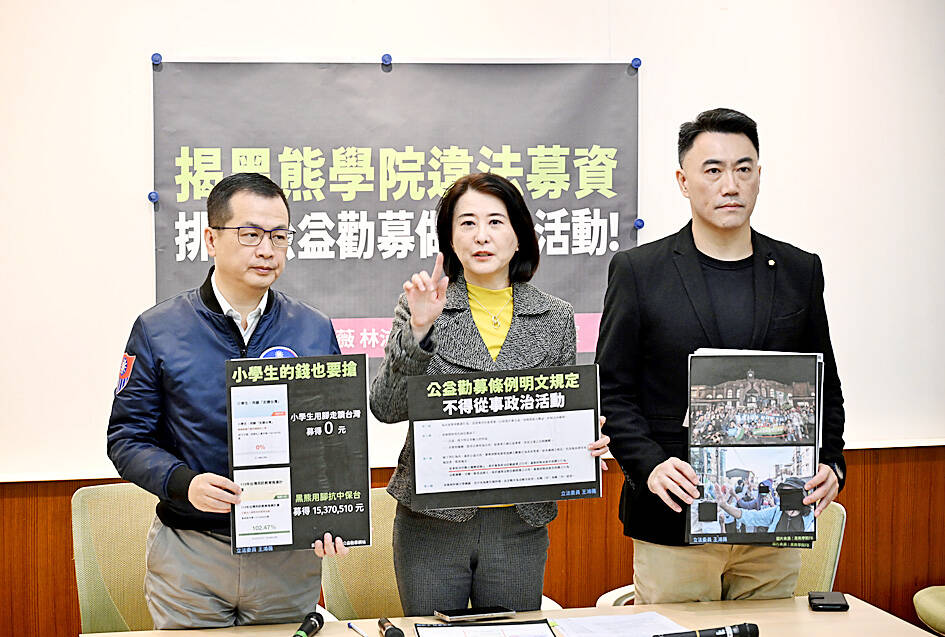Chinese Nationalist Party (KMT) lawmakers yesterday accused the Kuma Academy of illegal fundraising, saying it engaged in politics during its public welfare activities.
The academy, a nonprofit civil defense organization, last year launched a fundraising campaign named “the Project of Promoting Civil Defense Education in Taiwan” via the Ministry of Health and Welfare’s public welfare fundraising platform.
At a news conference yesterday, KMT Legislator Jonathan Lin (林沛祥) cited publicly available data as saying that the project last year covered almost all of the academy’s own agenda and events, with up to NT$1.5 million (US$45,645) allocated as what he called propaganda budget.

Photo: Lo Pei-de, Taipei Times
Another NT$3 million was appropriated to a civil defense-themed sports event named “Stand up as Taiwan,” which was the only walking event held by the academy last year, he said.
However, the event was part of a political campaign, he said, adding that the Executive Yuan’s Central Taiwan Joint Services Center Deputy Director Wu Yin-ning (吳音寧) joined the walk, and the Democratic Progressive Party (DPP) flag was pictured in a lot of event photos.
The project has collected more than NT$15 million in funds, KMT Legislator Wang Hung-wei (王鴻薇) said.
The ministry’s platform aims to effectively manage fundraising activities and leverage social resources to promote public welfare, especially for disadvantaged groups, she said.
Those who already have fundraising capabilities such as the academy should not compete with the disadvantaged for the resources on the platform, Wang said, adding that the academy had secured funds on its own fundraising Web site before.
It not only illegally raised funds, but also crowded out other fundraisers, such as for elderly people living alone, people with rare diseases or physical disabilities, and many other child welfare groups, she said.
The ministry should promptly investigate the academy, as its public welfare project was an act of “exploitation” for the benefit of the DPP, she added.
The academy’s activities contravened Article 3 of Charity Donations Destined For Social Welfare Funds Implementation Regulations (公益勸募條例), which forbids groups or individuals who engage in politics from participating in public welfare fundraising, KMT Legislator Lo Chih-chiang (羅智強) said.
The budget of NT$410 million appropriated by the Ministry of the Interior for its Whole-of-Society Defense Resilience Training Program had a budget item called “parent-child civil defense fair,” projected to cost NT$9 million, he said.
However, civil defense fairs are held almost exclusively by the academy, and it has raised NT$2 million for such an event, Lo said.
“Given such fundraising capabilities, why would the government subsidize the academy’s project?” he asked.
Kuma Academy chief executive officer Chu Fu-ming (朱福銘) said the KMT and the Taiwan People’s Party have been smearing the organization’s reputation since China’s Taiwan Affairs Office listed it as “die-hard Taiwanese independence separatists.”
Academy chairwoman Liu Wen (劉文) said the academy applied for a fundraiser as required by the law, with a plan submitted in 2023.
The project items are in line with the academy’s core business of education, including lectures on civil defense for schools and non-profit organizations, civil defense fairs for children and social media content about civil defense knowledge, she said.
Asked whether the academy crowded out disadvantaged groups, Liu said the platform allows people to see all legally approved public welfare fundraising projects and is not a donation channel.

Nipah virus infection is to be officially listed as a category 5 notifiable infectious disease in Taiwan in March, while clinical treatment guidelines are being formulated, the Centers for Disease Control (CDC) said yesterday. With Nipah infections being reported in other countries and considering its relatively high fatality rate, the centers on Jan. 16 announced that it would be listed as a notifiable infectious disease to bolster the nation’s systematic early warning system and increase public awareness, the CDC said. Bangladesh reported four fatal cases last year in separate districts, with three linked to raw date palm sap consumption, CDC Epidemic Intelligence

The manufacture of the remaining 28 M1A2T Abrams tanks Taiwan purchased from the US has recently been completed, and they are expected to be delivered within the next one to two months, a source said yesterday. The Ministry of National Defense is arranging cargo ships to transport the tanks to Taiwan as soon as possible, said the source, who is familiar with the matter. The estimated arrival time ranges from late this month to early next month, the source said. The 28 Abrams tanks make up the third and final batch of a total of 108 tanks, valued at about NT$40.5 billion

Two Taiwanese prosecutors were questioned by Chinese security personnel at their hotel during a trip to China’s Henan Province this month, the Mainland Affairs Council (MAC) said yesterday. The officers had personal information on the prosecutors, including “when they were assigned to their posts, their work locations and job titles,” MAC Deputy Minister and spokesman Liang Wen-chieh (梁文傑) said. On top of asking about their agencies and positions, the officers also questioned the prosecutors about the Cross-Strait Joint Crime-Fighting and Judicial Mutual Assistance Agreement, a pact that serves as the framework for Taiwan-China cooperation on combating crime and providing judicial assistance, Liang

Reports of Taiwanese going missing, being detained or interrogated, or having their personal liberties restricted in China increased about fourfold annually last year, the Mainland Affairs Council (MAC) said yesterday. Last year, 221 Taiwanese who traveled to China were reported missing, were detained and interrogated, or otherwise had their personal freedom restricted, up from 55 the previous year, the council said. Reopening group tours to China would be risky, as it would leave travelers with no way to seek help through official channels after Beijing shut down dialogue between the associations tasked with handling cross-strait tourism, the MAC said. Taipei’s Taiwan Strait Tourism